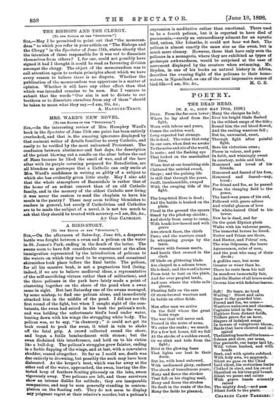A BIRD-STORY.
[To THE EDITOR 01 THE "srscTAros."] Srn,—On the afternoon of Saturday, June 4th, a desperate battle was fought between a swan and a pelican on the water in St. James's Park, ending in the death of the latter. The swans seem to have felt considerable resentment at the alien immigration represented by the introduction of pelicans to the waters on which they used to be supreme, and occasional skirmishes took place before the final battle. The pelican, for all his massive beak, is not a pugnacious bird (being, indeed, if we are to believe medimval ideas, a representative of the self-sacrificing virtues rather than of militarism), and the three pelicans in the park have lately made a point of clustering together on the shore of the pond when a swan came in sight. But last Saturday one of the swans managed, by some mishap, to find one pelican alone, and immediately attacked him in the middle of the pond. I did not see the first round of the fight, but when I caught sight of the com- batants, the swan had seized in his beak the pelican's neck, and was holding the unfortunate bird's head under water, beating down with his wings the struggling white body. The pelican was, so to say, "in chancery ; " it could not get its beak round to peck the swan, it tried in vain to shake off the fatal grip. A crowd collected round the shore, and began a futile bombardment with stones ; but the swan disdained this interference, and held on to his victim like a bull-dog. The pelican's struggles grew fainter, ending in a feeble flapping of the wings, and at last, with a convulsive shudder, ceased altogether. So far as I could see, death was due entirely to drowning, but possibly the neck may have been dislocated. As the keeper's boat, which was far away at the other end of the water, approached, the swan, leaving the dis- torted heap of feathers floating piteously on the lake, swam vigorously away. Two pelicans are left, and these survivors show an intense dislike for solitude ; they are inseparable companions, and may be seen generally standing in contem- plation on the floating raft. They do not seem to display any poignant regret at their relative's murder, but a pelican's expression is meditative rather than emotional. There used to be a fourth pelican, but it is reported to have died of pneumonia,—surely an extraordinary ailment for an aquatic bird, unless, like Iolanthe, it could not bear wet feet. The pelican is almost exactly the same size as the swan, but is much more clumsy. However, those that have only seen the pelicans in a menagerie, where they are exhibited as types of grotesque awkwardness, would be surprised at the ease of movement displayed by the creature when swimming. Mr. Bryden, in one of his books on natural history in Africa, describes the evening flight of the pelicans to their home- waters, in Ngamiland, as one of the most impressive scenes of


































 Previous page
Previous page